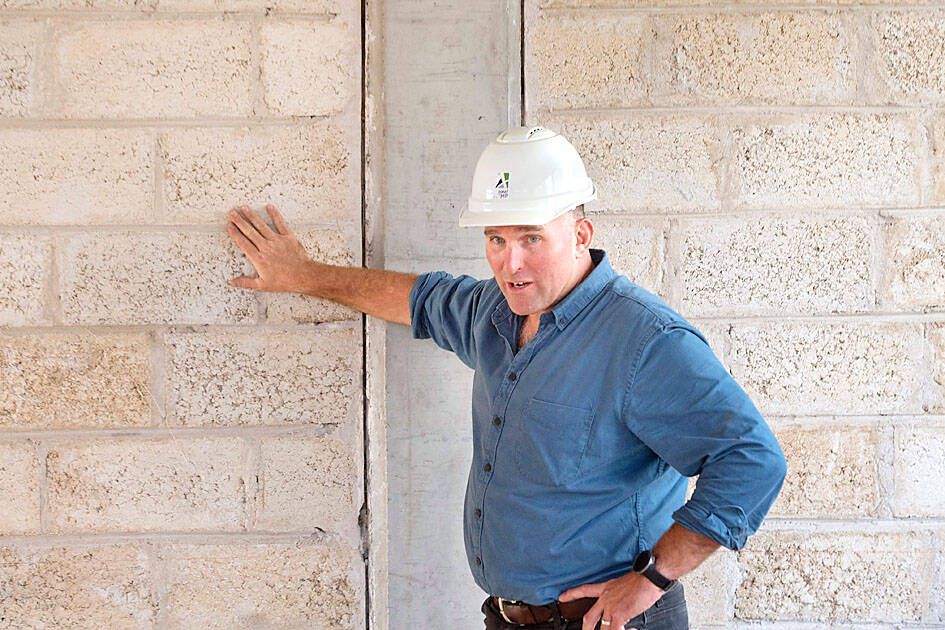With 12 stories, a breathtaking view of Cape Town’s imposing Table Mountain and a minimal ecological footprint, the world’s tallest building made with industrial hemp is soon to open its doors in South Africa.
Workers in central Cape Town are putting the finishing touches to the 54-room Hemp Hotel, which is due to be completed next month.
“Hempcrete” blocks derived from the cannabis plant have been used to fill the building’s walls, supported by a concrete and cement structure.

Photo: AFP
Hemp bricks are becoming increasingly popular in the construction world thanks to their insulating, fire-resistant and climate-friendly properties. Used notably in Europe for thermal renovation of existing buildings, the blocks are carbon negative — meaning their production sucks more planet-warming gases out of the atmosphere than it puts in.
“The plant absorbs the carbon, it gets put into a block and is then stored into a building for 50 years or longer,” said Boshoff Muller, director of Afrimat Hemp, a subsidiary of South African construction group Afrimat, which produced the bricks for the hotel.
“What you see here is a whole bag full of carbon, quite literally,” Muller said as he patted a bag of mulch at a brick factory on the outskirts of Cape Town, where hemp hurds, water and lime are mixed together to make the blocks.
The industrial hemp used for the Hemp Hotel had to be imported from Britain, as South Africa banned local production up to last year, when the government started issuing cultivation permits. South African President Cyril Ramaphosa has made developing the country’s hemp and cannabis sector an economic priority, saying that it could create more than 130,000 jobs.
Afrimat Hemp is preparing to produce its first blocks made only with South African hemp.
Hemp Hotel architect Wolf Wolf, 52, sees this as a game-changer to make hemp buildings more widespread in this corner of the world.
“It shouldn’t be just a high-end product,” said Wolf, whose firm is involved in several social housing projects in South Africa and neighboring Mozambique.
Yet cost remains an issue.
“Hemp is 20 percent more expensive to build with” compared with conventional materials, Afrimat Hemp’s carbon consultant Wihan Bekker said.
However, as the world races to lower carbon emissions, the firm sees “huge opportunities” for its green bricks, Bekker said.
Carbon credits — permits normally related to the planting of trees to safeguard tropical rainforests that companies buy to offset their emissions — could help make hempcrete blocks more financially palatable, he said.
“We can fund forests, or we can fund someone to live in a hemp house. It’s the same principle,” Bekker said.
The carbon footprint of a 40m2 house built with hemp is 3 tonnes of carbon dioxide lower than that of a conventional building, Afrimat Hemp said.
“We see this as a bit of a lighthouse project,” Muller said of the Hemp Hotel. “It shows hemp has its place in the construction sector.”
Hemp Hotel has been ranked the “tallest building to incorporate hemp-based materials in the world” by Steve Allin, director of the Ireland-based International Hemp Building Association.

Shamans in Peru on Monday gathered for an annual New Year’s ritual where they made predictions for the year to come, including illness for US President Donald Trump and the downfall of Venezuelan President Nicolas Maduro. “The United States should prepare itself because Donald Trump will fall seriously ill,” Juan de Dios Garcia proclaimed as he gathered with other shamans on a beach in southern Lima, dressed in traditional Andean ponchos and headdresses, and sprinkling flowers on the sand. The shamans carried large posters of world leaders, over which they crossed swords and burned incense, some of which they stomped on. In this

Indonesia yesterday began enforcing its newly ratified penal code, replacing a Dutch-era criminal law that had governed the country for more than 80 years and marking a major shift in its legal landscape. Since proclaiming independence in 1945, the Southeast Asian country had continued to operate under a colonial framework widely criticized as outdated and misaligned with Indonesia’s social values. Efforts to revise the code stalled for decades as lawmakers debated how to balance human rights, religious norms and local traditions in the world’s most populous Muslim-majority nation. The 345-page Indonesian Penal Code, known as the KUHP, was passed in 2022. It

Near the entrance to the Panama Canal, a monument to China’s contributions to the interoceanic waterway was torn down on Saturday night by order of local authorities. The move comes as US President Donald Trump has made threats in the past few months to retake control of the canal, claiming Beijing has too much influence in its operations. In a surprising move that has been criticized by leaders in Panama and China, the mayor’s office of the locality of Arraijan ordered the demolition of the monument built in 2004 to symbolize friendship between the countries. The mayor’s office said in

‘TRUMP’S LONG GAME’: Minnesota Governor Tim Walz said that while fraud was a serious issue, the US president was politicizing it to defund programs for Minnesotans US President Donald Trump’s administration on Tuesday said it was auditing immigration cases involving US citizens of Somalian origin to detect fraud that could lead to denaturalization, or revocation of citizenship, while also announcing a freeze of childcare funds to Minnesota and demanding an audit of some daycare centers. “Under US law, if an individual procures citizenship on a fraudulent basis, that is grounds for denaturalization,” US Department of Homeland Security Assistant Secretary Tricia McLaughlin said in a statement. Denaturalization cases are rare and can take years. About 11 cases were pursued per year between 1990 and 2017, the Immigrant Legal Resource